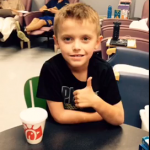Help Your Food-Allergic Child Feel Confident, Not Fearful

With food allergies, it’s necessary to maintain concern in order to be vigilant about the problem food. But it’s important not to instill anxiety in your child. Anxiety can cause social isolation and even interfere with your child’s school work. By helping your food allergic child understand their food allergy and explaining the consequences of not being safe, they will gain more confidence and self-assurance. If your child is showing signs of anxiety, it’s important to recognize the signs and know how to respond. Here are some valid suggestions:
- Listen and be empathetic. Do not dismiss their feelings or minimize what they are experiencing. What your child is feeling is very real and frightening and they are looking to you for unconditional support.
- Empower them with knowledge. At an age appropriate time, explain to your child how an allergic reaction occurs. Let your food allergic child know that it’s safe to be near a person eating a problem food provided that they do not share the food or utensils.
- Suggest your child keep a journal. By writing down their worries or concerns, you can better understand firsthand what they’re feeling. Review it together and try to problem solve solutions. A worry is about something that may not happen. For these worries, you can try to teach your child relaxation techniques and positive self-messages.
- 4. Relaxation techniques help. Listening to calm music, reading a book and deep breathing are effective relaxation techniques to help your child to become calm.
- Encourage participation in daily activities. And remember, do this without discounting their fears or anxiety.
- Manage your own anxiety. Children are perceptive and will know if you are scared and anxious about their food allergy. When they are younger, allow them to be around their allergen so they can learn how to function, even if a sibling is eating a peanut butter sandwich in the same room.
If you find these techniques are not working, you may want to consider seeing a psychologist to learn techniques of cognitive behavioral therapy to manage your child’s anxiety. There are psychologists who specialize in food allergy anxiety, but your allergist will have trusted recommendations for you, as well.




